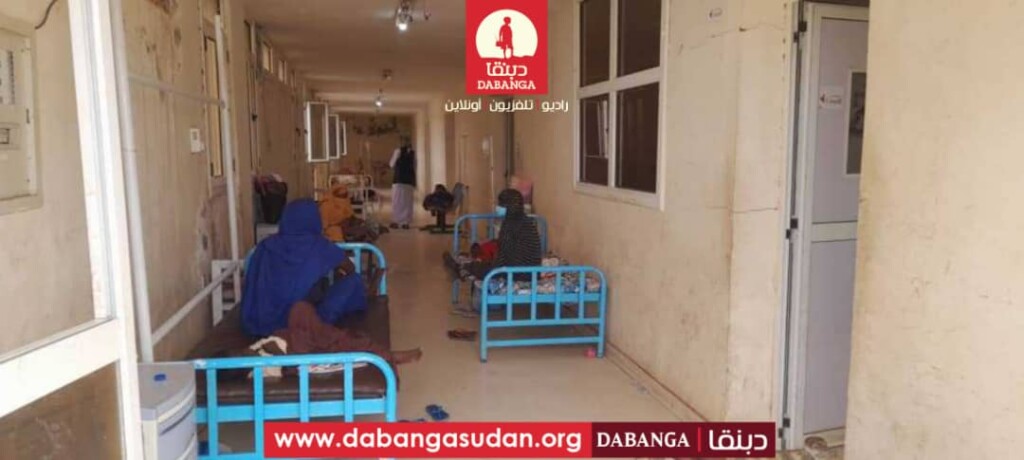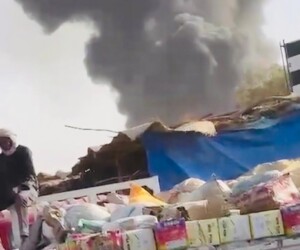Sudan’s Health Minister confirms cholera outbreak in three states

Cholera patients at Wad El Hilu Rural Hospital in Kassala in July 2024 (File photo: Radio Dabanga)
The federal Ministry of Health yesterday acknowledged the outbreak of cholera in Sudan, with 17 deaths and 268 cases reported in Kassala, El Gezira, and Khartoum states. The ministry indicated that the Wad El Hilu area in Kassala alone has recorded seven deaths and more than 150 cases.
This is the first time the Ministry of Health has acknowledged the outbreak, since the first suspected cases appeared three weeks ago. Until now, the ministry has euphemistically referred to cases of ‘acute watery diarrhoea’, which is one of the symptoms of cholera*.
A media circular on Monday says that Minister of Health, Haisam Ibrahim, visited Wad El Hilu, accompanied by the director of the Ministry of Health in the state, Ali Adam, to assess the situation of the disease outbreak.
During his visit to Wad El Hilu, the Minister also visited the El Magarif water station, which 40 per cent of the local population depends on, in addition to other local water sources, noting the importance of chlorinating water.
Local officials have criticised the state government for not providing water purification supplies in Wad El Hilu. A medical source told Radio Dabanga that Wad El Hilu Rural Hospital is overcrowded with patients, especially in the isolation ward for cholera patients. He pointed out that some patients are being accommodated in the hospital corridors and others at the entrance. He pointed out that intravenous solutions and mattresses are not available, in addition to emergency medications.
The ministry said that the delegation inspected the isolation centre and learned about the shortages and problems facing the hospital in terms of supplies and medical equipment.
The medical source criticised the health authorities for “continuing to cover up the epidemics in the region” and “not allowing journalists and volunteers to see the real numbers”. He pointed out that “the authorities did not provide any aid to limit the epidemic, there is no financial support, and that medical workers do not have the most basic resources”.
At a meeting on Tuesday with the wali (governor) of Kassala state, Maj Gen (Retd) El Sadig El Azrag, health minister Ibrahim discussed the challenges and problems facing the health system and facilities in the state and the diseases associated with the autumn season, especially after the emergence of cholera cases in the Wad El Hilu area and the necessity for joint coordination.
In confirmation reports from the area, volunteers say that the emergency department of internal medicine at Kassala Hospital was closed due to the high frequency of cholera and suspected cholera cases, which led to overcrowding of the department with patients. They pointed to the continuous increase in cases of cholera and watery diarrhoea and their mixing with other patients in the same place.
They revealed the deterioration of the hospital environment and the lack of beds with the overcrowding of the emergency room, and indicated that patients are forced to bring beds from their homes or rent them from a place adjacent to the teaching hospital.
A report of the Environmental Health and Food Control Department at the Ministry of Health shows noted varying rates of availability of types of medicines in the states , and the inventory of chlorine stocks in a number of states, the distribution of chlorine to the states, and the implementation of water safety activities in a number of states, as well as environmental sanitation and vector control. The health promotion report indicated the implementation of home visits, community interventions and awareness through social media and media outlets, and interventions in shelters. The medical supplies report noted varying rates of availability of types of medicines in the states.
*Cholera – key facts
- Cholera is an acute diarrhoeal disease that can kill within hours if left untreated.
- Cholera is a disease of poverty affecting people with inadequate access to safe water and basic sanitation.
- Conflict, unplanned urbanisation and climate change all increase the risk of cholera.
- Researchers have estimated that each year there are 1.3 to 4.0 million cases of cholera, and 21 000 to 143 000 deaths worldwide due to cholera.
- Most of those infected have no or mild symptoms and can be successfully treated with oral rehydration solution.
- Severe cases need rapid treatment with intravenous fluids and antibiotics.
- Provision of safe water and basic sanitation, and hygiene practices is critical to prevent and control the transmission of cholera and other waterborne diseases.
- Oral cholera vaccines should be used in conjunction with improvements in water and sanitation to control cholera outbreaks and for prevention in areas known to be high risk for cholera.
- A global strategy on cholera control, Ending cholera: a global roadmap to 2030, with a target to reduce cholera deaths by 90% was launched in 2017.
Source: World Health Organization











 and then
and then